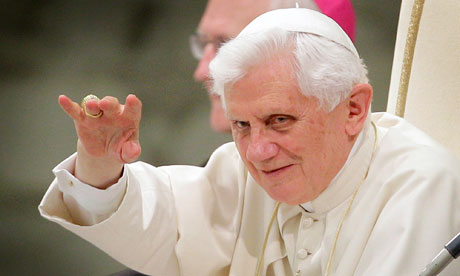
The Vatican has moved to clarify remarks made by the pope on the use of condoms, insisting he had "not reformed or changed the [Roman Catholic] church's teaching".
But the statement made clear that Pope Benedict XVI was prepared to consider the use of condoms in certain, limited circumstances.
The statement, and the pope's interview reported in a book to be published this week, suggested that, notwithstanding the interpretation of remarks he made last year on his visit to Africa, Benedict accepted that condoms reduced the risk of infection from Aids.
His spokesman, Father Federico Lombardi, said the pontiff's view was that "Aids cannot be solved only by the distribution of condoms".
But, he added: "At the same time, the pope considered an exceptional situation in which the exercise of sexuality represents a real risk to the lives of others. In this case, the pope does not morally justify the exercise of disordered sexuality, but believes that the use of condoms to reduce the risk of infection is a 'first step on the road to a more human sexuality', rather than not to use it and risking the lives of others."
Benedict caused surprise by taking as his example a male prostitute who used a condom to protect his client. But in so doing he avoided breaching his church's opposition to artificial contraception: birth control not being an issue in male homosexual relations.
What remained unclear, however, was whether the pope was subtly edging open the door to the use of condoms in heterosexual relations, if only by couples in which one partner was HIV-positive.
The Vatican's statement was issued as Catholics struggled to get to grips with the pope's characteristically scholarly phrasing in the interviews, to be published on Wednesday.
In the book, the pope also said that the wartime pontiff Pius XII – accused of not speaking out against the mass deportation and killing of Jews by the Nazi regime – was a "great righteous" man who saved more Jews than anyone else.
Benedict's "comments fill us with pain and sadness and cast a menacing shadow on Vatican-Jewish relations", said Elan Steinberg, vice president of the American Gathering of Holocaust Survivors and their Descendants, in an emailed statement to Associated Press at the weekend.
Several theologians have argued that the pope's remarks on condoms did not represent a change of position, let alone of doctrine. But many ordinary Catholics took them as a green light for "safe sex" and they were welcomed by Aids campaigners. A spokesman for the United Nations' joint programme on HIV/Aids called the comments "a significant and positive step forward". He added "This move recognises that responsible sexual behaviour and the use of condoms have important roles in HIV prevention".
In Zimbabwe, a Catholic priest interviewed by the Associated Press had no doubt about the import. "Now the message has come out that [men and women] can go ahead and do safe sex, it's much better for everyone," said Father Peter Makome.
But, as the Vatican noted in a longer, Italian version of its statement, the pope's remarks were made in a "colloquial and not magisterial" form. In other words, they represented his private opinions rather than official teaching.
Writing for the Catholic World Report website, US academic Janet Smith, argued: "The Holy Father is simply observing that for some homosexual prostitutes the use of a condom may indicate an awakening of a moral sense."
Spanish theologist Juan José Tamayo agreed. "I don't detect any change in the words of the pope," he told the Cadena SER radio network. "They ratify traditional doctrine, opposed to the use of condoms, and even confirm the irresponsible remarks he made in Africa about Aids."
In 2009, Benedict prompted international uproar when he told journalists condoms should not be used because they could increase the spread of Aids. In the book, he stands by his remark, but in more nuanced terms.
He argues "condoms alone do not resolve the question itself. More needs to happen." And in the key passage, he says: "There may be a basis in the case of some individuals, as perhaps when a male prostitute uses a condom, where this can be a first step in the direction of a moralisation, a first assumption of responsibility, on the way toward recovering an awareness that not everything is allowed and that one cannot do whatever one wants. But it is not really the way to deal with the evil of HIV infection. That can really lie only in a humanisation of sexuality."
Asked by the interviewer if the Catholic church was not opposed in principle to the use of condoms, the pope replied: "She of course does not regard it as a real or moral solution, but, in this or that case, there can be nonetheless, in the intention of reducing the risk of infection, a first step in a movement towards a different way, a more human way, of living sexuality.
Papal Interviewer
"Light of the World, to be published on Wednesday, is the latest of three book-length interviews with Benedict XVI by Peter Seewald, a German journalist and former radical leftwinger. It is the first of his books to be published since Joseph Ratzinger became pope five years ago.
Seewald, who comes from the pope's native Bavaria, interviewed Benedict last summer at the mansion at Castel Gandolfo to which popes retire in the hottest months of the year.

